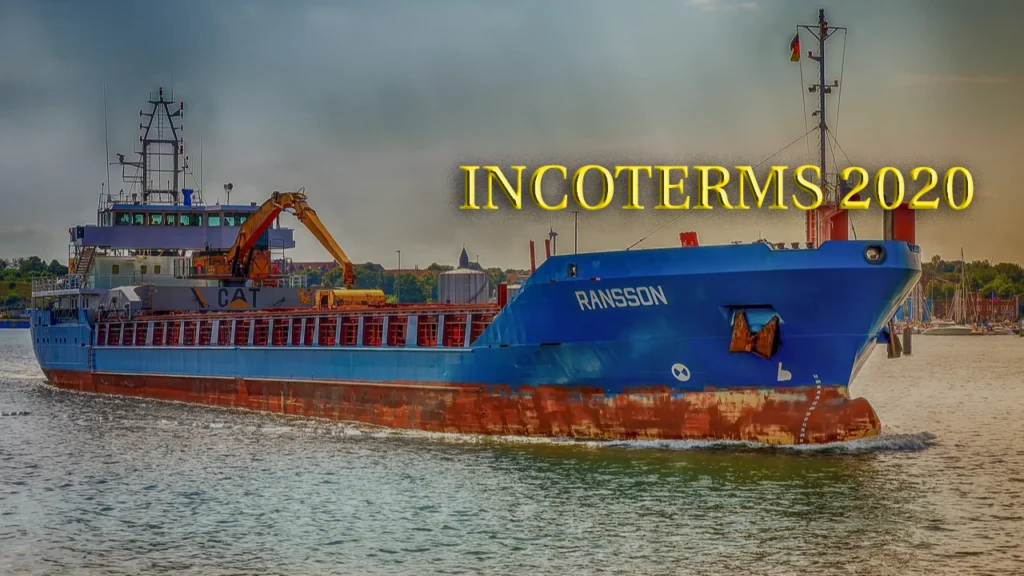
Learn everything about ‘Incoterms 2020’ in this guide. Understand each Incoterm’s meaning, application, responsibilities, and how to choose the right one for your business. Ideal for exporters, importers, freight professionals, and anyone involved in international logistics.
What Are Incoterms?
Incoterms are internationally recognized commercial terms that define the responsibilities of sellers and buyers for the delivery of goods under sales contracts. Developed by the International Chamber of Commerce (ICC), Incoterms help facilitate smooth global trade by clarifying who pays for freight, who handles customs clearance, and when risk passes from seller to buyer.
For example, in an EXW (Ex Works) agreement, the seller’s obligations end when the goods are made available at their premises, and the buyer assumes responsibility from that point forward. In contrast, with DDP (Delivered Duty Paid), the seller handles everything until the goods are delivered to the buyer’s location, including duties and taxes.
The History and Purpose of Incoterms
The need for clear international trade rules led the ICC to publish the first Incoterms in 1936. These rules have been revised several times—in 1953, 1967, 1976, 1980, 1990, 2000, 2010, and most recently in 2020—to reflect changes in global trade practices and logistics systems.
The purpose of Incoterms is to:
Establish a common language for trade
Define who does what, pays what, and is responsible for what
Reduce misunderstandings and litigation
Align with global trade compliance and best practices
Why Incoterms Matter in International Trade?
International trade can be complex, with goods crossing multiple borders and involving numerous parties. Misunderstandings over who is responsible for costs or risk can cause delays, extra costs, or even legal disputes.
Using Incoterms helps:
Improve clarity in commercial agreements
Ensure cost and responsibility distribution is clear
Establish risk transfer points that are recognized internationally
Increase trust between parties in different legal jurisdictions
Incoterms 2020: The Current Standard
Incoterms 2020, the latest version, made several improvements:
DAT to DPU: The term Delivered at Terminal (DAT) was renamed Delivered at Place Unloaded (DPU) to avoid confusion about delivery locations.
Clarified insurance responsibilities: Especially in CIF and CIP, the minimum insurance cover was specified (Clauses C and A).
FCA and Bill of Lading issue: Sellers using FCA can now request that the buyer’s carrier issue a Bill of Lading with an on-board notation to fulfill L/C requirements.
More precise language: Incoterms 2020 are easier to understand, especially for small and medium enterprises.
Key Concepts Behind Incoterms 2020
Understanding Incoterms 2020 requires familiarity with the following concepts:
Delivery: Refers to the point at which the risk of loss or damage to the goods passes from seller to buyer.
Risk: Incoterms define when the risk is transferred.
Costs: Specifies who pays for transport, loading, insurance, duties, etc.
Mode of Transport: Some Incoterms are for sea/inland waterway only, others apply to all modes.
Customs Clearance: Identifies which party handles export and import procedures.
Overview of All 11 Incoterms 2020 Edition
EXW (Ex Works) Incoterms 2020
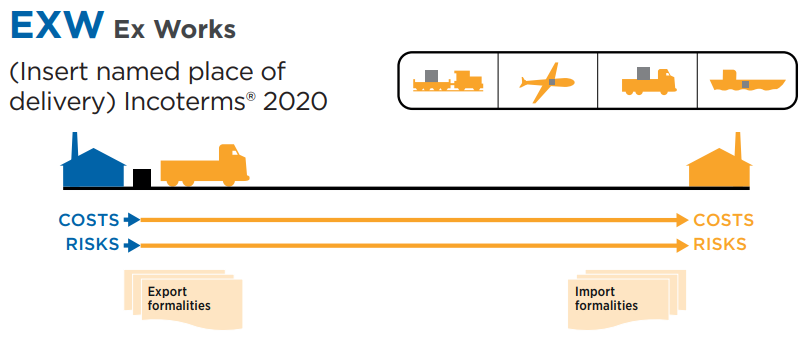
Seller makes goods available at their premises.
Buyer bears all costs and risk from that point onward.
Used when the buyer wants full control over logistics.
FCA (Free Carrier) Incoterms 2020
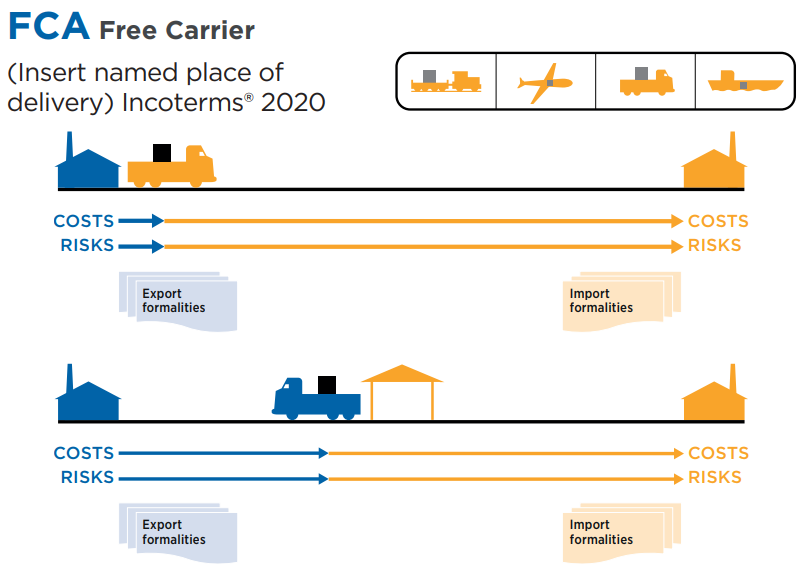
Seller delivers goods to carrier at named place.
Ideal for air, truck, rail, and containerized shipping.
Allows flexibility with multimodal transport.
FAS (Free Alongside Ship) Incoterms 2020
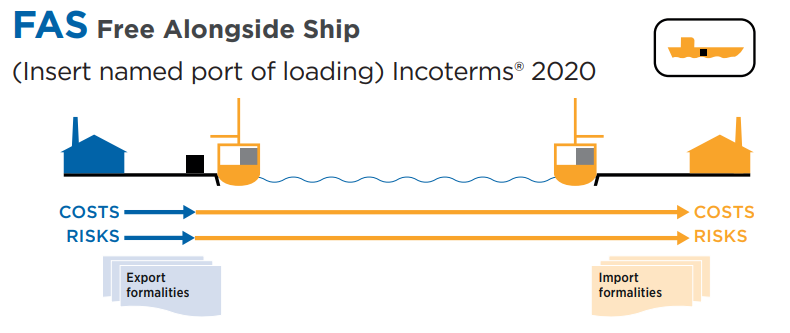
Seller delivers goods alongside the ship.
Only applicable to sea transport.
Used for heavy-lift or bulk cargo.
FOB (Free on Board) Incoterms 2020
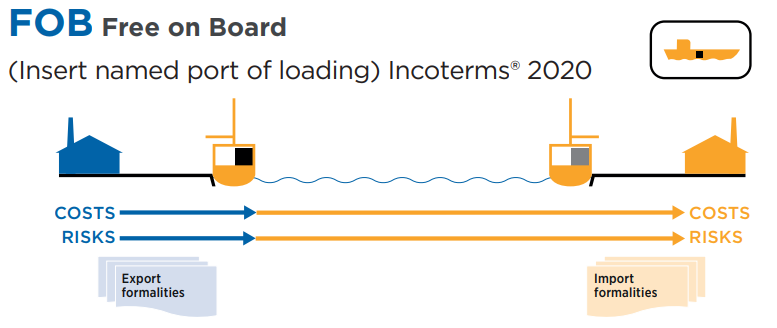
Seller loads goods onto ship at port.
Buyer assumes risk once goods are onboard.
Common in bulk exports and marine shipments.
CFR (Cost and Freight) Incoterms 2020
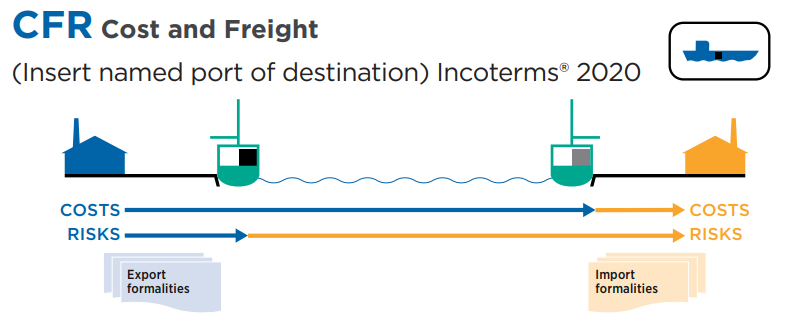
Seller pays for carriage to destination port.
Buyer handles insurance and risk after loading.
Appropriate for large ocean freight shipments.
CIF (Cost, Insurance & Freight) Incoterms 2020
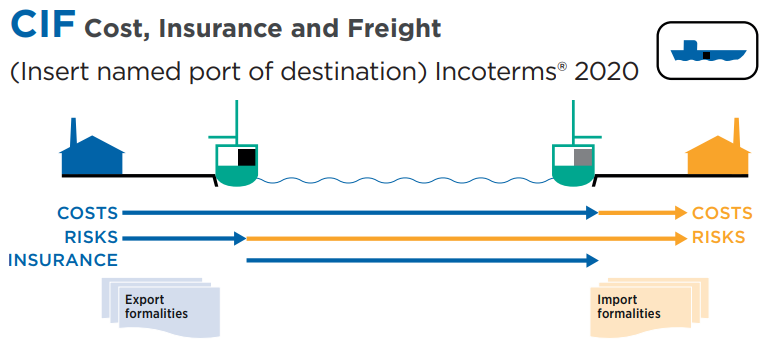
Same as CFR, but seller also provides minimum insurance.
Popular for commodity trades where the buyer prefers basic insurance cover.
CPT (Carriage Paid To) Incoterms 2020
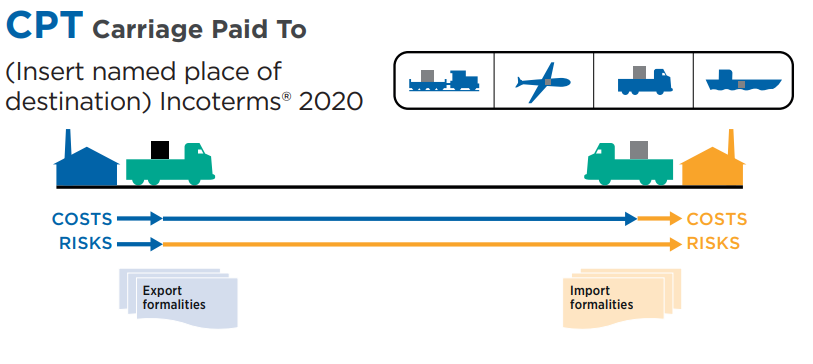
Seller pays to deliver goods to named location.
Risk passes when goods are handed to carrier.
Versatile across transport modes.
CIP (Carriage and Insurance Paid To) Incoterms 2020
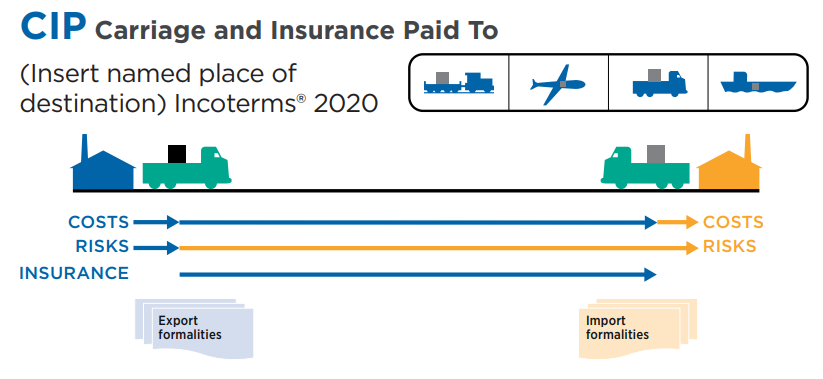
Same as CPT but includes insurance.
Seller insures goods for minimum cover to destination.
Ideal for valuable or fragile cargo.
DAP (Delivered At Place) Incoterms 2020
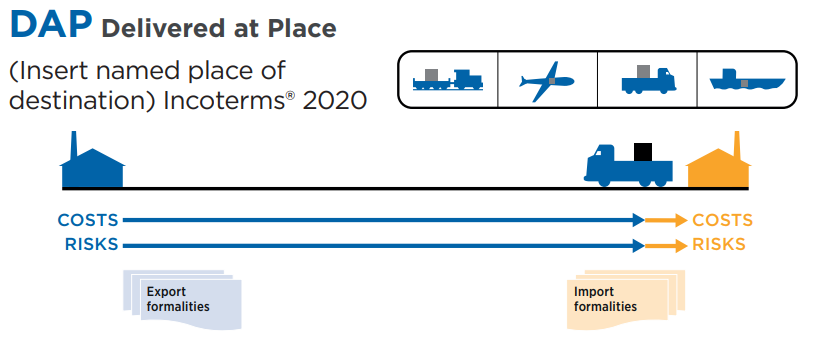
Seller delivers goods ready for unloading.
Buyer handles duties and import clearance.
Simplifies logistics for buyers.
DPU (Delivered at Place Unloaded) Incoterms 2020
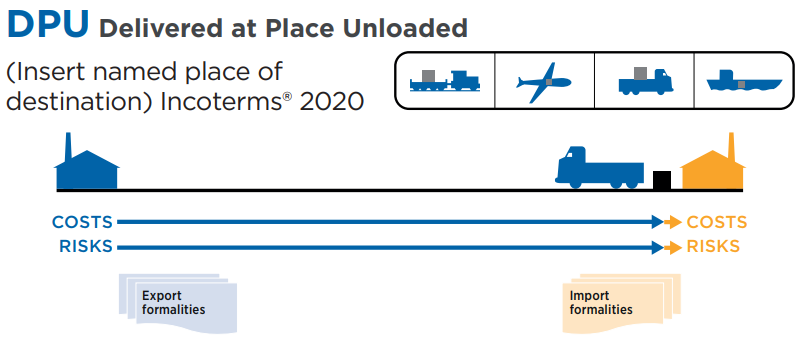
Seller delivers and unloads goods at named place.
Suitable where seller has better unloading capabilities.
DDP (Delivered Duty Paid) Incoterms 2020
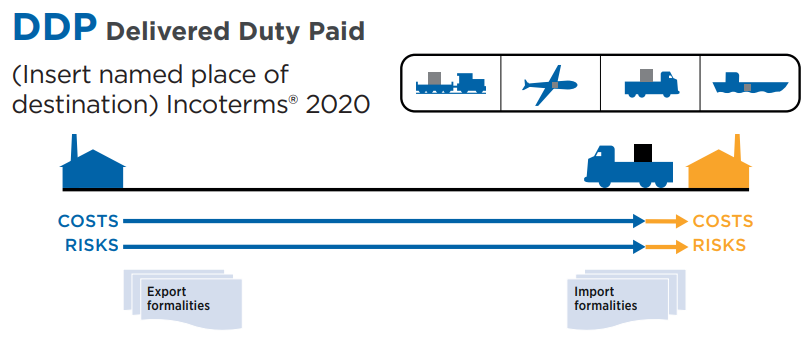
Seller is responsible for all charges up to buyer’s location.
Easiest for buyer; highest responsibility for seller.
Common in e-commerce and direct-to-consumer sales.
How to Choose the Right Incoterm
Choosing an Incoterm depends on:
Experience level of buyer/seller
Infrastructure available at origin and destination
Insurance requirements
Control over transport and documentation
Cost allocation preferences
Use a decision matrix comparing Incoterms across these criteria. For example, a new importer may prefer DDP, while an experienced exporter might use FOB.
Common Mistakes to Avoid
Using FOB or CFR for containerized shipments (FCA or CPT are better).
Assuming DDP includes unloading.
Not specifying the exact location (e.g., FOB Mumbai Port vs. just FOB).
Ignoring export/import regulatory compliance responsibilities.
Incoterms vs Other Trade Terms
Incoterms regulate logistics obligations. They do not cover:
Payment methods (handled by LC or Open Account terms)
Transfer of ownership (handled by national laws)
Breach of contract penalties
Incoterms and Insurance Responsibilities
Only CIF and CIP obligate the seller to arrange insurance.
Insurance should cover the full value of goods + margin.
Always clarify the type of insurance and coverage levels (Clauses A, B, or C).
Incoterms and Export/Import Documentation
Each Incoterm affects documentation needs:
EXW: Buyer needs export license and clearance.
DDP: Seller must handle all paperwork, including import duties.
CIF/FOB: Seller typically provides invoice, packing list, B/L, and certificate of origin.
Role of Freight Forwarders in Incoterms
Offer logistics support, customs clearance, and documentation assistance.
Help ensure the selected Incoterm aligns with routing and pricing.
Critical in complex or multi-country supply chains.
Legal Implications and Risk Transfer
Incoterms must be clearly incorporated into contracts (e.g., “CIF Dubai, Incoterms 2020”).
Courts often look to the chosen Incoterm to resolve disputes.
Risk transfer clauses are vital for claims and liability assessment.
Incoterms in Different Regions (EU, USA, Asia, Middle East)
EU: Businesses prefer DDP and DAP to simplify intra-union shipping.
USA: FCA and FOB are popular; emphasis on customs compliance.
Asia: EXW, FOB, and CIF dominate due to high export volumes.
Middle East: Risk-sensitive markets often use DDP or FCA.
Case Studies: Incoterms in Action
Case 1: A UK importer of spices from India opts for CIF London, minimizing insurance and freight responsibilities.
Case 2: A German electronics company uses CIP Frankfurt Airport to ensure insurance coverage for high-value shipments.
Case 3: A Saudi retailer purchases garments from Turkey using DDP Riyadh, allowing full door delivery including duties.
The Future of Incoterms
Growing use of e-commerce will push terms like DDP.
Digital Bills of Lading and smart contracts may influence Incoterm revisions.
Sustainability and carbon accounting might lead to new obligations in Incoterms 2030.
Final Checklist for Businesses Using Incoterms
✅ Confirm correct Incoterm for transport mode.
✅ Define named place clearly.
✅ Align Incoterm with payment terms.
✅ Assign export/import documentation responsibilities.
✅ Review insurance and liability coverage.
Conclusion
Incoterms are the foundation of global trade agreements. Understanding and using them correctly ensures efficiency, reduces conflict, and protects financial and legal interests. Whether shipping a container or a pallet, selecting the right Incoterm is a smart business decision.
FAQs About Incoterms
Q: Can Incoterms be modified?
A: Yes, but changes must be clearly stated in writing.
Q: Are Incoterms the same as delivery terms?
A: No. Delivery terms may refer to timeframes, whereas Incoterms refer to logistics responsibility.
Q: What is the best Incoterm for exporters?
A: It depends, but FCA gives flexibility without taking full risk.
Related posts:
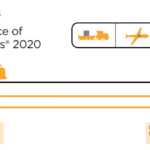 EX Works (EXW) Incoterms Explained: Exporter’s Complete Guide
EX Works (EXW) Incoterms Explained: Exporter’s Complete Guide
 How to Start an Export Business in India in 2025 – Beginner’s Guide
How to Start an Export Business in India in 2025 – Beginner’s Guide
 Essential Export Documents Required in 2025 – Complete Guide for Exporters
Essential Export Documents Required in 2025 – Complete Guide for Exporters
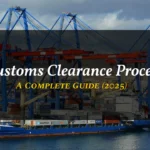 Customs Clearance Process for Export Business: A Complete Guide (2025)
Customs Clearance Process for Export Business: A Complete Guide (2025)
 Top 25 High margin export products from India
Top 25 High margin export products from India
 Demurrage, Detention, and Free Time in Shipping: Complete Guide for Exporters and Importers
Demurrage, Detention, and Free Time in Shipping: Complete Guide for Exporters and Importers
